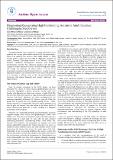Files in this item
Diagnosing/recognising high functioning autism in adult females : challenging stereotypes
Item metadata
| dc.contributor.author | Evans-Williams, Claire V. M. | |
| dc.contributor.author | Williams, Damien John | |
| dc.date.accessioned | 2016-07-25T23:31:17Z | |
| dc.date.available | 2016-07-25T23:31:17Z | |
| dc.date.issued | 2016-06-03 | |
| dc.identifier | 244503098 | |
| dc.identifier | 7aad3a4a-63e8-4cf0-8f9f-86aa72f1868a | |
| dc.identifier.citation | Evans-Williams , C V M & Williams , D J 2016 , ' Diagnosing/recognising high functioning autism in adult females : challenging stereotypes ' , Autism-Open Access , vol. 6 , no. 3 , 1000179 . https://doi.org/10.4172/2165-7890.1000179 | en |
| dc.identifier.issn | 2165-7890 | |
| dc.identifier.uri | https://hdl.handle.net/10023/9207 | |
| dc.description.abstract | The apparent global rise in Autism has led many to describe it as an epidemic and a major public health concern [1-4]. The extraordinary claim of an epidemic has, however, been widely refuted [5]. Most recently DSM-V unified the four DSM-IV diagnostic categories of Autistic Disorder (“previously referred to as “Autism”), Asperger’s Disorder, is Childhood Disintegrative Disorder, and Pervasive Developmental Disorder Not Otherwise Specified, into the single category of Autistic Spectrum Disorder. This shift in diagnostic criteria will change the landscape of autism further, in terms of its presentation, prevalence, and treatment. However, in order to ensure appropriate diagnosis and treatment/intervention across the spectrum, it necessary to address some of the mis-understandings and stereotypes that plague diagnostic and research endeavours with regards autism. | |
| dc.format.extent | 3 | |
| dc.format.extent | 403700 | |
| dc.language.iso | eng | |
| dc.relation.ispartof | Autism-Open Access | en |
| dc.subject | R Medicine | en |
| dc.subject | NDAS | en |
| dc.subject | SDG 3 - Good Health and Well-being | en |
| dc.subject.lcc | R | en |
| dc.title | Diagnosing/recognising high functioning autism in adult females : challenging stereotypes | en |
| dc.type | Journal article | en |
| dc.contributor.institution | University of St Andrews. School of Medicine | en |
| dc.contributor.institution | University of St Andrews. WHO Collaborating Centre for International Child & Adolescent Health Policy | en |
| dc.contributor.institution | University of St Andrews. Public Health Group | en |
| dc.identifier.doi | 10.4172/2165-7890.1000179 | |
| dc.description.status | Peer reviewed | en |
This item appears in the following Collection(s)
Items in the St Andrews Research Repository are protected by copyright, with all rights reserved, unless otherwise indicated.

